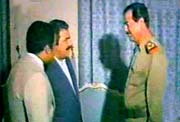Mojahedin Khalq terrorist organisation (Rajavi cult) predicts imminent overthrow in Iran after being backed by London
In Iran, it’s more important that the MEK was allied with Saddam Hussein in his
You might have overlooked a story in last Thursday’s edition of this newspaper. The New York Times article related how a court of appeals in London had decided the British government was wrong to have included an Iranian resistance group on a list of banned terrorist organizations. It was a victory for the group, the Mujahedeen-e-Khalk, also known as the People’s Mujahedeen of Iran. The MEK has been fighting the terrorist designation in Britain for seven years. The ruling could lead the British government to remove the MEK from its terrorist list.
While many readers might have skimmed past the story, the news made one resident of Northwest Arkansas especially happy. Hooshang Nazarali, the Iranian American who owns a store in the small town of Crosses southeast of Fayetteville, found the court’s ruling encouraging.
He’s been a supporter of the MEK’s parent organization for years. Mr. Nazarali came to the United States from his native Iran just before the Islamic revolution of 1979. He’s stayed in touch with what’s going on there. One day, he hopes to be able to return to Iran-once it’s been freed from the rule of the theocrats who have held power since the revolution.
He’s pinned his hopes on regime change from within. That’s where the MEK fits into the picture. Its parent organization is based in Paris, with other significant support in London and Iraq. About 3,800 MEK members have lived-disarmed and under guard-in a camp outside Baghdad since the American invasion of Iraq in 2003. Before that, the MEK had carried out a series of attacks against Iranian targets. Despite the British court ruling, the U.S. government continues to list the MEK as a terrorist organization.
On the surface, the disconnect seems odd. The U.S. is bitterly opposed to the Iranian government, which the MEK also wants to see removed. The U.S. and the MEK would appear to be natural allies. Hooshang Nazarali says the U.S. designation of the MEK as a terrorist organization in 1997 was an effort to appease Iran. He’s hoping that the court ruling in Britain might lead to a reconsideration of the MEK’s standing in the U.S., too. But, so far, the Bush administration says it has no plans to lift its ban.
American appeasement of Iran? Iran’s been a focus of American threats and hostility for some time now. The U.S. accuses Iran of trying to acquire nuclear weapons and of supplying insurgents in Iraq who continue to kill American troops. The accusations have grown so shrill that many of us worry that we’re heading toward outright war with Iran.
That’s not Hooshang Nazarali’s desire. For years, he’s backed a third way to deal with Iran’s admittedly difficult government. Not war. Not negotiations. But working with resistance inside and outside of Iran to overthrow the current leadership. That’s why he was so pleased with the ruling by the British court. He thinks the ruling was an important step toward strengthening the internal resistance. From his contacts inside Iran, he believes the government is widely disliked. He goes so far as to predict its imminent overthrow.
For all of Hooshang’s Nazarali’s enthusiasm, the MEK probably won’t play much of a role in any possible change of government in Iran. Despite the court ruling in Britain, the MEK is still considered a terrorist group, not only by the U.S. but also by the European Union, even though the MEK officially renounced violence in 2000.
In Iran, it’s more important that the MEK was allied with Saddam Hussein in his war with Iran back in the 1980s. Such history isn’t likely to be approved of by patriotic Iranians, no matter how much they dislike their own government. Meanwhile, many consider the umbrella group, the National Council of Resistance of Iran, to be little more than a cult, with loyalty to its leader, Maryam Rajavi, more important than its political positions.
The U.S. has a long, unhappy history with Iran. We meddled in the Iranians’ internal affairs for decades before their 1979 revolution. They’ve got reasons for calling us the Great Satan. And we’ve got reasons to be wary of them, although this administration’s loose talk of war borders on insanity. Another American war in that part of the world would be another disaster-for everybody.
No war. No American interference in Iran’s domestic affairs. What’s left? Contrary to Hooshang Nazarali’s wishes, both sides are eventually going to have to do the only sensible thing: Start talking to each other again. To the extent that negotiations might lessen the risk of war, they would be cause for relief, if not celebration.
George Arnold is opinion editor of the Arkansas Democrat-Gazette’s northwest edition.
George Arnold, The Arkansas Democrat Gazette,



